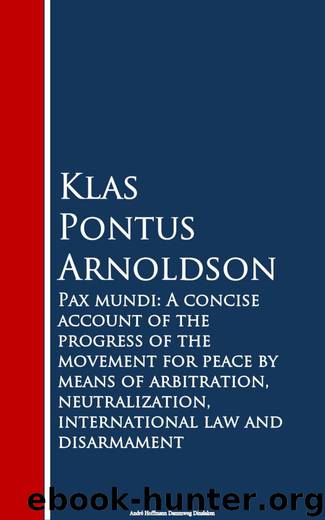Pax mundi: A concise account of the progress of the movement for peace by means of arbitration, neutralization, international law and disarmament by Klas Pontus Arnoldson

Author:Klas Pontus Arnoldson [Arnoldson, Klas Pontus]
Language: eng
Format: epub
Published: 2016-09-06T22:00:00+00:00
Many entertain the belief that the first condition of such a disarmament must be to absolve the rulers themselves from the dangerous power they possess in being able at their discretion to declare war, conclude peace, and make alliances one with another for warlike aims.
In our country many propositions have been brought forward for limiting this power especially with regard to the concluding of treaties without so much as consulting the whole Swedish Cabinet.
As is well known, even in the time of Gustavus Adolphus, the royal power did not extend beyond the king having to consult the Riksdag, and to obtain its consent, whether he were engaging in a war or entering into an alliance with foreign powers. The absolute monarchs seized upon greater power, and the law-makers of 1809 simply ratified this dangerous extension of it.
Now we are unceasingly told, when the subject of defence is on, about sacrifices. They declare to us that no sacrifice should be esteemed too great. The State has the right of enlisting soldiers by compulsion, fathers, husbands and sons, for the defence of the country; and not only when it is really a question of defence, but when it is a matter of preparation for defence, that is drill, even if this extend to years of barrack life in time of peace.
These are the sacrifices demanded from the people.
There are those who think, would it not be much better if the people, on their side, demanded a little security that the country should not be far too thoughtlessly plunged into war—war which can no longer be carried on by paid volunteers, but with members of families conscripted by force, by means of compulsory service?
Such security could be effected by changing the formulas of government §§ 12 and 13, and the constitutional law § 26, partly so that the conclusion of treaties should require the confirmation of a united meeting of the Swedo-Norse cabinet councils, and partly also, that certain treaties, namely such as include a greater political intricacy, should be subjected to the confirmation of the Riksdag and the Storting, as has been the case with certain treaties of commerce—bagatelles in comparison with the entanglement of the kingdoms in war.
It is simply an assertion, refuted by experience, that the king cannot make use of the law here treated of.
During the Crimean war, according to a treaty, we should have been entangled in the war, had not the Peace of Paris intervened. So also during the last Dano-German war, when interference on our part, as the result of a treaty, would have taken place, had not the death of King Frederic VII. occurred.
The same thing would have happened during the last Franco-German war, if the battle of Wörth had not thrown out the reckoning, according to a treaty which entailed our interference. Into all these treaties the king could enter without giving the whole Cabinet the opportunity of expressing its opinion.
The danger of such a power begins to be increasingly felt, especially in England.
Download
This site does not store any files on its server. We only index and link to content provided by other sites. Please contact the content providers to delete copyright contents if any and email us, we'll remove relevant links or contents immediately.
| Africa | Americas |
| Arctic & Antarctica | Asia |
| Australia & Oceania | Europe |
| Middle East | Russia |
| United States | World |
| Ancient Civilizations | Military |
| Historical Study & Educational Resources |
Underground: A Human History of the Worlds Beneath Our Feet by Will Hunt(12090)
Sapiens by Yuval Noah Harari(5366)
Navigation and Map Reading by K Andrew(5151)
The Sympathizer by Viet Thanh Nguyen(4385)
Barron's AP Biology by Goldberg M.S. Deborah T(4148)
5 Steps to a 5 AP U.S. History, 2010-2011 Edition (5 Steps to a 5 on the Advanced Placement Examinations Series) by Armstrong Stephen(3727)
Three Women by Lisa Taddeo(3425)
Water by Ian Miller(3179)
The Comedians: Drunks, Thieves, Scoundrels, and the History of American Comedy by Nesteroff Kliph(3073)
Drugs Unlimited by Mike Power(2591)
A Short History of Drunkenness by Forsyth Mark(2291)
DarkMarket by Misha Glenny(2207)
The House of Government by Slezkine Yuri(2200)
And the Band Played On by Randy Shilts(2199)
The Library Book by Susan Orlean(2064)
Revived (Cat Patrick) by Cat Patrick(1987)
The Woman Who Smashed Codes by Jason Fagone(1969)
The Absolutely True Diary of a Part-Time Indian by Sherman Alexie(1909)
Birth by Tina Cassidy(1901)
